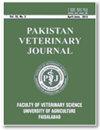求助PDF
{"title":"Combined Effect of Monieziosis and Hypomicroelementosis on Some Hematological, Biochemical and Hormonal Parameters in Merino Sheep","authors":"M. Abdelhamid","doi":"10.29261/PAKVETJ/2020.068","DOIUrl":null,"url":null,"abstract":"Received: Revised: Accepted: Published online: May 23, 2020 June 28, 2020 July 15, 2020 August 04, 2020 This study was done to determine the impact of monieziosis infection combined with hypomicroelementosis on some hematological, biochemical and hormonal parameters of Soviet Merino sheep in the Astrakhan region. 20 sheep, aging 3 years old and average 43±1.6 kg body weight were used. Sheep were divided into two groups. First group contained 10 sheep and these sheep were naturally infected with monieziosis and clinically were suffered from hypomicroelementosis, emaciation, reduced growth rate, anemia, diarrhea and pale mucosa. Second group contained 10 sheep were apparently healthy and free from internal parasites and they were used as a control group. The first group was given Praziver (praziquantel and ivermectin) for treatment monieziosis, while they intramuscularly injected with Sedimin (selenium, iodine and iron) and were introduced daily into the feed with CoCl2. Faecal and blood samples from both groups were collected, before and 30 days after treatment, and analyzed for some hematological, biochemical and hormonal parameters. Our results revealed that there was a significant decrease in Hb and RBCs values, while total WBCs and eosinophils were significantly increased in the diseased group than in healthy one. Biochemical analysis showed a significant decrease in serum antioxidant enzymes (CAT, SOD and GSH-Px) and a significant increase in serum DC and MDA in the diseased group as compared with the control group. Hormonal analysis showed a significant increase in ACTH, TSH, Cortisol and a significant decrease in serum T4 and T3. After treatment with Praziver, Sedemin and CoCl2, there was a significant effectiveness to maintain blood parameters within normal levels in the experimental group and increase reproductive outcome from these sheep. ©2020 PVJ. All rights reserved","PeriodicalId":19845,"journal":{"name":"Pakistan Veterinary Journal","volume":"41 1","pages":"107-111"},"PeriodicalIF":5.4000,"publicationDate":"2021-03-01","publicationTypes":"Journal Article","fieldsOfStudy":null,"isOpenAccess":false,"openAccessPdf":"","citationCount":"7","resultStr":null,"platform":"Semanticscholar","paperid":null,"PeriodicalName":"Pakistan Veterinary Journal","FirstCategoryId":"97","ListUrlMain":"https://doi.org/10.29261/PAKVETJ/2020.068","RegionNum":3,"RegionCategory":"农林科学","ArticlePicture":[],"TitleCN":null,"AbstractTextCN":null,"PMCID":null,"EPubDate":"","PubModel":"","JCR":"Q1","JCRName":"VETERINARY SCIENCES","Score":null,"Total":0}
引用次数: 7
引用
批量引用
单核细胞病和微量元素缺乏症对美利奴羊血液学、生化和激素指标的联合影响
本研究旨在研究monieziosis感染合并低微量元素血症对阿斯特拉罕地区苏联美利奴羊血液、生化和激素参数的影响。试验羊20只,年龄3岁,平均体重43±1.6 kg。羊被分成两组。第一组10只羊,自然感染monieziosis,临床表现为微量元素缺乏症、消瘦、生长速率降低、贫血、腹泻、黏膜苍白。第二组为10只健康无体内寄生虫的绵羊,作为对照组。第一组给予吡喹酮和伊维菌素治疗肺孢子虫病,同时肌肉注射Sedimin(硒、碘和铁),每日加入CoCl2。分别于治疗前和治疗后30 d采集两组患者的粪便和血液样本,分析血液、生化和激素指标。我们的研究结果显示,患病组的Hb和rbc值明显下降,而白细胞总数和嗜酸性粒细胞明显高于健康组。生化分析显示,与对照组相比,患病组血清抗氧化酶(CAT、SOD、GSH-Px)显著降低,血清DC、MDA显著升高。激素分析显示ACTH、TSH、皮质醇显著升高,血清T4、T3显著降低。在用Praziver、Sedemin和CoCl2治疗后,实验组的血液参数维持在正常水平,并提高了这些羊的繁殖结果。©2020 PVJ。版权所有
本文章由计算机程序翻译,如有差异,请以英文原文为准。


